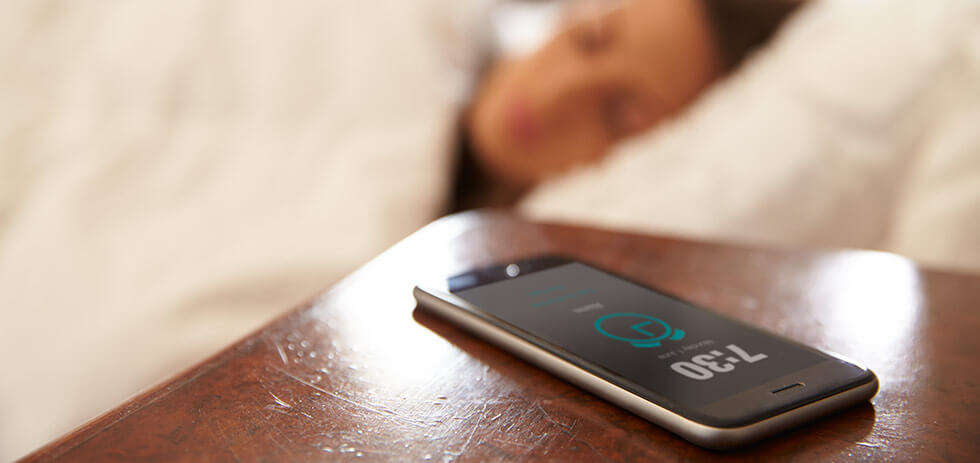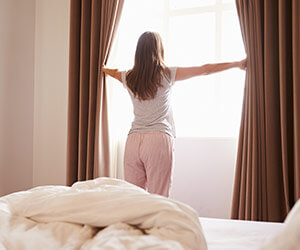Sleep: The Power Of One More Hour

Let’s take a closer look to see just how beneficial sleep can have on us all:
Enhance Physical Performance
Athletes who extended their sleep to at least nine hours each night saw an improvement in their performance. Researchers at Stanford University conducted a study on seven women and five males on a college varsity tennis team, and found their enhanced sleep time resulted in faster sprinting drills and experienced increased hitting accuracy.
Increase Learning and Memory
Sleep has a profound effect on learning and memory. Sleep deprivation can negatively impact learning skills and prevent memories from forming.
Scientists hypothesized that REM (rapid eye movement) sleep plays an essential role in the acquisition of learned material. For instance, California researchers asked volunteers to spend the day mulling solutions to a series of creative problems one morning and would be tested on these in the afternoon that same day.
Half of the volunteers were asked to stay awake during the day and the others were instructed to take a nap. Volunteers who took naps were asleep long enough to enter REM sleep for a significant amount of time, and they were the ones who did 40% better on the test than those who did not nap. REM sleep allowed the volunteers’ brain to work creatively on the problems that had been introduced before sleep.
Improve Blood Pressure And Hypertension
It is thought that sleep helps stress hormones by blood regulation and keeps your nervous system healthy. If adequate sleep isn’t achieved, your body lacks the ability to regulate these stress hormones and can lead to high blood pressure.
Studies have also been observed carefully to have demonstrated a strong relationship between sleep and hypertension. In particular, a Sleep Heart Health study found those who slept less than 5 hours per night experienced higher frequency of prevalent hypertension.
Control Genetics
From the time we are young, sleep is sacrificed for productivity, entertainment, education, and a host of other priorities. We embrace the habit of late night hangouts with friends, early morning practices, all-nighters cramming sessions for exams, and stress-induced insomnia as we navigate through our careers.
Sleep is genetically controlled and is affected by the circadian system. The circadian system is physical, mental, and behavioral changes that are affected by our environment, such as sleeping at night and being awake during the day––responding to your light and dark atmosphere. Studies using fruit flies have been key to finding the molecular gears of biological clocks and the cells that control circadian rhythms.
As you can see, sleep is crucial to working with our biological system which affects hormone release, eating habits, digestion, body temperature, and other important bodily functions.
Prevent Chronic Diseases
Diabetes and obesity are no strangers to society and continue to increase with time. Sleep restriction plays a role in the effect of these chronic diseases because the assessment of nocturnal glucose tolerance occurs during sleep.
Sleep restriction can impair glucose metabolism, which could affect endogenous processes that are related to energy balance. This impairment and excess weight can increase the development of type 2 diabetes.
One study in particular took eleven healthy, young men and evaluated their sleep and nutrition over a course of thirteen days. These men were subjected to 4 hours in bed for 6 nights followed by 12 hours in bed for 6 nights. Each man ate 3 identical carbohydrate-rich meals and were limited to bed rest on the last two days of each condition. The fifth morning of each condition, a test was conducted of an intravenous glucose tolerance––followed by the sixth day, the collection of blood samples were to be conducted every 10–30 minutes for 24 hours.
The results concluded when the men were restricted sleep, they showed approximately 40% lower glucose, and the acute insulin response to glucose was 30% lower compared to their sleep extension condition. Even cortisol concentrations were enhanced due to sleep deprivation, which cortisol is your body’s main stress hormone that controls your mood, motivation, and fear.
Tissue Repair And Muscle Growth
Tissue repair and muscle growth severely depend on sleep. During the sleeping cycle, your body goes into recovery mode and repairs your tissues and muscles. Without this time, your body cannot access its own muscle-building hormones.
Sleep deprivation certainly has some scary effects on an athlete’s performance. But what about other aspects of our lives? Michael J. Breus, PhD says, “Reducing your nighttime sleep by as little as one and a half hours for just one night could result in a reduction of daytime alertness by as much as 32%.”
Decrease Mortality Risk
It is said that, “Reduced sleep time is a greater mortality risk than smoking, high blood pressure, and heart disease.” With more than 85 sleep disorders identified by the American Sleep Disorders Association, we learn that as many as 50 to 70 million Americans are affected.
“Some researchers suggest that sleep deprivation should be recognized with the same seriousness that has been associated with the societal impact of alcohol,” Breus said.
Ways To Incorporate More Sleep
You may be thinking an earlier bedtime is definitely in order. We’ve taken a quick glance at the benefits of increasing your sleep time—even if it’s just one extra hour a day. We also looked at the significant disadvantages of losing sleep. Luckily, the Mayo Clinic offers some advice for getting better sleep:
- Start with creating a sleeping schedule. Give yourself eight hours of sleep each night. Try going to bed and rising each morning the same time each day. This consistency reinforces your body’s sleep-wake cycle.
- Avoid eating heavy meals before you go to bed. The discomfort of overeating may keep you awake. Also avoid caffeine, nicotine, and alcohol as these take hours to wear off.
- Set up a cool, dark and quiet environment that promotes relaxation. Even performing calm activities like a bath or mediating supports better sleep.
- Strategize short naps that are less than 30 minutes earlier in the day. Taking a nap later on in the day can interfere with your 8 hours of sleep at night.
- Doing basic exercises each day can promote better sleep.
- Manage stress in a productive way by writing down your worries on paper to remove them from your mind before bed.
Knowing these sleep benefits can help you set up a lifestyle that will be good to you in the short- and long-term. Take advantage of these tips, and watch yourself improve in more ways than one.
What kind of steps are you taking in improving your sleep? Let us know in the comment section below!
DISCLAIMER: This post is not intended to replace the advice of a medical professional. The above information should not be used to diagnose, treat, or prevent any disease or medical condition. Please consult your doctor before making any changes to your diet, sleep methods, daily activity, or fitness routine. ProForm assumes no responsibility for any personal injury or damage sustained by any recommendations, opinions, or advice given in this article. Always follow the safety precautions included in the owner’s manual of your fitness equipment.
Sources:
https://www.webmd.com/sleep-disorders/news/20191101/with-time-change-use-that-extra-hour-for-sleep
https://www.ncbi.nlm.nih.gov/pubmed/26325012
http://healthysleep.med.harvard.edu/healthy/matters/benefits-of-sleep/learning-memory
https://www.health.harvard.edu/blog/sleep-helps-learning-memory-201202154265
https://www.ncbi.nlm.nih.gov/pmc/articles/PMC2913764/
https://academic.oup.com/sleep/article/29/8/1009/2708444
https://www.ncbi.nlm.nih.gov/pmc/articles/PMC3153991/
https://www.nigms.nih.gov/education/pages/factsheet_circadianrhythms.aspx
https://jamanetwork.com/journals/jama/article-abstract/194179
https://www.ncbi.nlm.nih.gov/pmc/articles/PMC2084401/#!po=65.7895
https://www.sciencedirect.com/science/article/pii/S0140673699013768
https://www.webmd.com/a-to-z-guides/what-is-cortisol#1
https://www.proform.com/blog/anxiety-confidence-motivation-make-athlete/
https://www.sleep.org/articles/how-sleep-adds-muscle/
https://www.webmd.com/sleep-disorders/features/important-sleep-habits#1
https://www.webmd.com/sleep-disorders/features/important-sleep-habits#1
https://www.sleepfoundation.org/articles/sleep-studies
https://www.mayoclinic.org/healthy-lifestyle/adult-health/in-depth/sleep/art-20048379
https://www.nordictrack.com/learn/basic-exercises-do-at-home-every-day/











